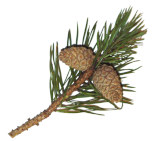Response (2009) to an article by Hank Grant on the website of the US Clan Grant Society
Despite the fact that the story of Clan Grant is now structurally complete there are some loose ends which it would be worth clearing up.
In the media recently was the suggestion that Oliver Cromwell was descended in the male line from a Grant and this reopens the can of worms which is the idea of an association between the name “Grant” and the French word “Grand”. Clearly this was not a true “Grant” – for why else change the surname? We must suppose that Oliver Cromwell was descended from someone who had the name “Grant” as a nickname or soubriquet. I have long accepted that the Norman French rendition of their word for “big” was variously (inter alia) “grant” and “graunt” and that this was not lost on the early Grants – so the ground was indeed laid for misinterpretation and for erroneous explanation.
The normal evidence adduced for the Grand/Grant connection is Hugh de Grandmesnil who was one of William the Conqueror’s main lieutenants. Many people have tried to allege that the name Grandmesnil was later truncated to Grand, whence Grant. Actually quite the contrary is the case – the name Grandmesnil was actually truncated to Mesnil, Meynell and several other variants. But the full name also deserves investigation. As a personal name the word Grandmesnil come from the place in Normandy. There are several places called “Mesnil”. Usually they have a personal name added as a suffix – thus “Mesnil-Robert” or “Mesnil-Simon” etc. The word “mesnil” comes from Latin, the full form being “mansionile” – “little house”. So far as I can see this refers to a house small by château standards which a noble would use when attending court – hence within commuting distance. In the case of Grandmesnil the Latin version (in the genitive) is “Grentonis mansion”. We should note another placename in the vicinity – Mesnil-au-grain. I rang a local who confirmed that in this latter case “grain” means “grain” as in corn. Thus we may be confident that, both because “big little house” is rather silly and because the original has the form “grent” rather than “grand”, Grandmesnil is a corruption of “the little house with something to do with grain”.
The fact is that there were people in the middle ages with the name “Grento” at least in its Latinised form. So in the case of Grandmesnil it may be that the little house was particularly associated with grain – or it could be associated with someone called “Grento”.
I was looking into this because of Duncan II’s Coldingham charter of 1094 (of which more in my book when I can get it published). The Mediaeval Latin project whom I contacted had no knowledge of the name Grento, but they passed me on to Oliver Padel of Cambridge who is heavily involved with the English Placenames’ Society. The kindest way of putting it is that there was no real meeting of minds, but in fairness it has to be said that he did draw my attention to a series of English charters from the 1100s.
In one case we have “William le grant”, where the absence of a capital demonstrates that this is a nickname, NOT a surname as we would understand it today. However there was a Gilbert Grandus in Oxfordshire in 1183 and 1192 who, in the last charter cited, has become “Grant”. [The source is the Eynsham Cartulary (Oxfordshire Historical Society, vols 49 and 51, 1907-8).] There is no indication of how long, if at all, this family may have persisted.
The fact that all this has defeated mediaeval scholars of Latin and of placenames is disappointing, but is far from conclusive for this reason: even today Romanian and Italian are very close – so much so that many Romanians can make themselves understood in Italy even with never having studied Italian. [There seems to be an open debate as to which came first: Romanian or Latin.] Romanian can come to our rescue for:
Grǎunţe
is the correct word for "grist" and for "grain";
Grǎunţos
is an acceptable translation of “gritty”, “pebbly”, “grained” or “grainy”;
Grǎunţelor
is the word for "graining".
This clearly implies that the word did indeed exist in low Latin even if it never found its way into scholarly works.
Bearing in mind that The Chiefs are counted from “one before Gregory” (ie Aulay) the adoption of the name Grant as a surname must date from no earlier than 1175 (though, as I argue in the text of my book it may have been in continuous use from c1060 as a nickname/soubriquet) – so it would be nigh impossible to try to attribute any of these English examples to a Scottish origin. Similarly the lack of any association with Olav Hemingsson’s brothers (Swein in the Borders or Richard in Sussex) suggests that even as a soubriquet it was NOT used eg by Heming.
All in all then, we may be safe in continuing to suppose that 99% of all Grants have their roots in Scotland – but we cannot wholly exclude the possibility that someone somewhere may be descended from an English Grant of wholly different lineage. Further exhaustive (and exhausting) research would be good to lay the matter to rest. Anyone up for the challenge?
